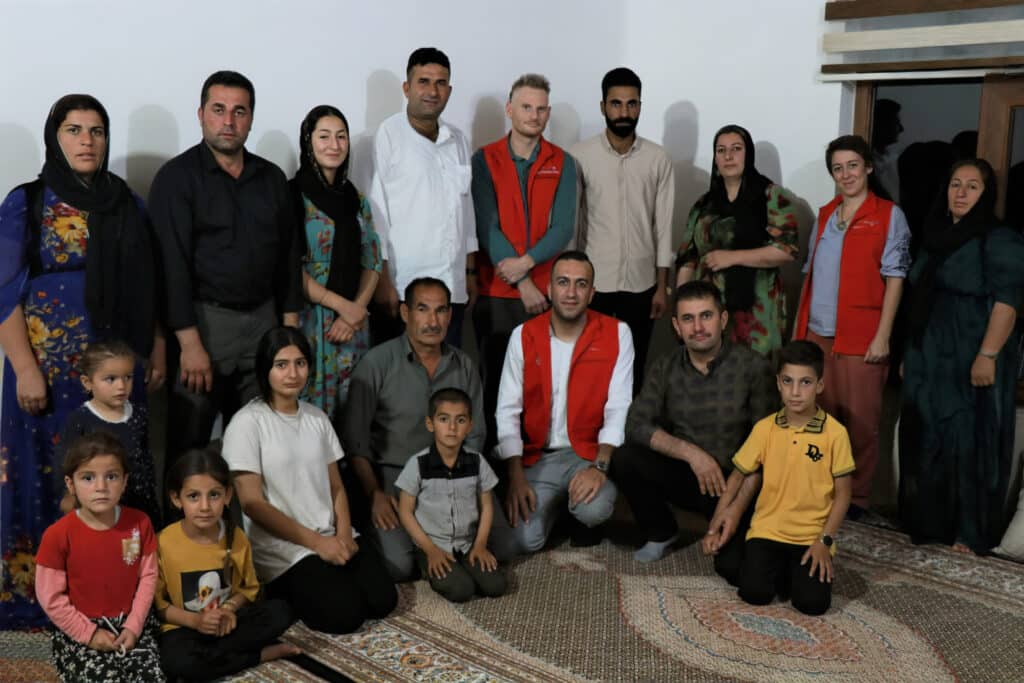Sharmin Assad Ishmael was born in 1993 in the Kurdish mountain village of Khawakurk, right in the corner of the three-way border between Iran, Iraq and Turkey. The Kurdish people have for over a century been divided between these three borders, and Khawakurk is sadly symbolic— Sharmin’s relatives are spread across the three different countries. At one time, they could cross each frontier freely to visit those close relatives, but today, there is no one there to visit.
The conflicts involving these three hostile nations, particularly Turkey’s military bombardments and incursions into Iraq in recent decades, have made it extremely dangerous to live in the region.
In 2004, a few days after a heavy bombardment in a small village near Khawakurk, three children of Sharmin’s uncle, Mam Ali, were killed. The children, all under ten, found an unexploded bomb and picked it up, thinking it was a toy. It detonated in their hands. After this tragedy, everyone left the village. No media reported the deaths of these children in the remote village, and no government official offered help.
Sharmin, Mam Ali, and their whole family decided to move to the bigger town of Sidakan, where they thought they would be safe from further tragic events. In October 2022, Sharmin travelled to visit relatives in the mountains, bringing her four-year-old daughter Shonem and nine-year-old son Mohamed. Her relatives are nomadic herders who roam with their flocks of animals as Kurdish people have done in this border region for centuries, moving up to the mountains in summer and down to the plains for winter.
Sharmin decided to stay overnight. In the morning, she helped with the milking and was washing herself to get ready for morning prayers. Suddenly, she heard a loud sound and felt a sharp, intense pain like being stabbed in the back. She saw the blood on her hand and fainted.
When Sharmin regained consciousness, her daughter Shonem was at her side, saying, “Mommy, please don’t die.” Her arm, side, and leg were all injured in the blast. She still has a piece of shrapnel the size of a finger in her leg. The doctor said they cannot remove it because it is close to a nerve.
For months afterwards, Sharmin could not sleep. She was bedridden for five months, during which time her husband and relatives looked after her and her children. The bombing was a life-changing event for the whole family. Whenever Sharmin’s daughter, Shonem, hears a loud noise like a slamming door, she goes into a state of panic. Sharmin can’t afford the medication she was prescribed and is still unable to function like she could before the bombing. “I feel like half a human being,” she says.

Although it has not been officially confirmed, the artillery shell that hit Sharmin almost certainly came from the Turkish military, who have launched several bombardments in this region before.
Sharmin’s family left the area and say they will never go back. Their story resonates with the experiences of many Kurdish people: full of tragedy and displacement, ordinary people trapped amongst the borders and bombings of regional powers. It is also a story of heroic resilience, and love and care shown by family members that can help endure even the most horrific events.
Sitting down to drink tea with this beautiful family who have lived through so much, it was impossible not to be deeply moved. If only the Turkish generals and politicians who authorised these bombings and the soldiers who carry them out could sit down for tea with these families. Maybe they would humbled and realise the human cost of their incursions into Iraqi Kurdistan. Instead, they dehumanise Kurdish civilians, seeing them only as impediments to their political goals. It makes it all the more critical for us at CPT to hear and retell the tales of heart-wrenching pain and inspiring resilience of families like Sharmin and Mam Ali.




